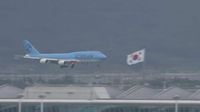The arrival of over 300 South Korean workers at Incheon International Airport on September 12, 2025, marked the dramatic end of a weeklong diplomatic crisis between Seoul and Washington. The workers, who had been detained during a sweeping U.S. immigration raid at a Hyundai-LG battery plant construction site in Georgia, returned home to a hero’s welcome—and to a nation seething with anger and confusion over the incident.
The chartered Korean Air Boeing 747-8I, carrying more than 310 South Koreans and several other Asian nationals, touched down just west of Seoul shortly after a marathon journey from Atlanta. According to Al Jazeera, the detainees made up the bulk of the 475 individuals swept up by U.S. immigration authorities in what has become the largest single-site immigration operation since President Donald Trump resumed office and vowed to intensify crackdowns.
South Korean officials, including presidential chief of staff Kang Hoon-sik, were on hand to greet the workers. "We feel sorry that we failed to bring them back home much earlier, though we did our best," Kang said in televised comments, as reported by the Associated Press. The atmosphere in the arrivals hall was one of relief and celebration, with workers clapping and shouting with joy as they were reunited with their families. Among the returnees were 316 South Koreans, along with Chinese, Japanese, and Indonesian nationals who had also been detained in the raid.
For many in South Korea, the images of their countrymen in handcuffs and chains, broadcast worldwide, were deeply unsettling. Outrage spread quickly, with protesters at the airport holding placards that mocked President Trump in an ICE uniform and accused Washington of betraying a key ally. One sign read: "You told us to invest, only to arrest us! Is this how you treat an ally?" This sentiment was echoed by President Lee Jae Myung, who called the raid "bewildering" and warned it could deter future investment. "Our businesses that have entered the United States are likely in a state of serious confusion," Lee stated at a news conference marking his first 100 days in office, according to Reuters.
The workers’ ordeal began on September 4, 2025, when U.S. immigration agents raided the Hyundai-LG battery plant construction site near Savannah, Georgia—a project valued at $4.3 billion and touted as Georgia’s largest economic development initiative. The detainees, including a pregnant woman, were transported to an immigration detention center in Folkston, Georgia, about 285 miles southeast of Atlanta. Video footage released by U.S. Immigration and Customs Enforcement showed federal agents directing workers to line up outside, some with their hands, ankles, and waists shackled. Others had plastic ties around their wrists as they boarded buses bound for Atlanta.
The raid was unusual not only for its scale but also for its target: South Korean nationals are rarely caught up in U.S. immigration enforcement actions. The incident quickly threatened to destabilize the decades-old partnership between the U.S. and South Korea, especially as both countries were working to finalize a significant trade deal. U.S. Commerce Secretary Howard Lutnick, in comments to CNBC, made the stakes clear: "Well, the Koreans didn’t sign. ... The Koreans either accept that deal or pay the tariffs. Black and white."
Back in Seoul, the political response was unusually unified. Politicians from across the spectrum condemned the raid, with at least 60 percent of South Koreans expressing disapproval in recent polls. The Korean Confederation of Trade Unions demanded an apology from President Trump, calling the administration’s actions "a clear violation of human rights" and urging the South Korean government to suspend U.S. investments.
Amid the mounting outrage, South Korean officials worked feverishly to negotiate the workers’ release. According to Fox News and Associated Press reports, the South Korean government reached an agreement with the U.S. that allowed the detainees to return home voluntarily, without the visa or re-entry restrictions that typically accompany deportations. Al Jazeera’s Jack Barton reported that "the South Korean government was able to negotiate with the Trump administration … and they were allowed in the end to [make] a voluntary return, and … there will be no visa restrictions or re-entry restrictions."
President Trump’s role in the resolution was pivotal. As NPR and Reuters detailed, Trump personally intervened, offering the detained workers the option to stay in the U.S. to help train American workers—a move aimed at encouraging knowledge transfer. However, only one South Korean national, who had relatives in the U.S., chose to remain. The rest opted to return home, a decision that caused a one-day delay in the departure of the chartered plane.
South Korean officials were adamant that the detainees not be handcuffed during their journey to the airport, a demand that was ultimately met. President Lee Jae Myung later called for improvements to the U.S. visa system, warning that Korean companies would likely hesitate to make new investments in the U.S. until such changes occurred. Lawmakers in Seoul also acknowledged that some workers may have overstepped the boundaries of their 90-day visa waiver or B-1 temporary business visas, but highlighted the long-standing difficulties South Korean companies face in obtaining short-term work visas for specialists at their high-tech U.S. plants.
In the wake of the raid, both governments agreed to discuss establishing a new visa category for Korean workers, according to South Korean Foreign Minister Cho Hyun. However, the broader impact on South Korean investment in the U.S. remains uncertain. Some South Korean workers have begun leaving other LG Energy Solution production sites in the U.S. due to visa concerns, and the company has reportedly asked subcontractors to prepare contingency plans and hire more local workers.
Industry executives have warned that the arrests will delay construction at the Georgia facility, though Kim Dong Myung, CEO of LG Energy Solution, sought to downplay concerns, stating that disruptions "would be within a level we can manage." Meanwhile, local officials in Georgia, including Governor Brian Kemp’s office, have stressed their commitment to maintaining strong trade relations with South Korea, noting a partnership that stretches back 40 years.
The diplomatic fallout has also reverberated beyond Korea. China’s foreign ministry called on the U.S. to "enforce laws impartially and to ensure the legitimate rights and interests of the involved Chinese citizens," while Japan has pledged to protect its nationals affected by the raid.
As the dust settles, the episode has left a lasting mark on U.S.-South Korea relations. The images of handcuffed workers and the ensuing political storm have raised tough questions about the future of foreign investment in America and the treatment of international workers. For now, the workers are back home, but the debate over visas, trade, and trust between allies is far from over.


